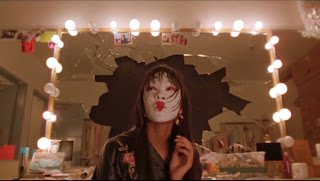Chinatown
(1974)
Directed by- Roman Polanski
*Jack Nicholson, Faye Dunaway, John Huston, Perry Lopez
'Cherchez la femme' in French means 'look for the woman', for it is a woman who is always at the heart of any and every crime.
The crime at hand is related to water, and yet the woman forms an integral part in its great puzzle.
LA is suffering from a drought and hundreds of gallons of water is being disposed off every night into the desert.
Who is behind this most incongruous conspiracy?
Private eye J.J. Gittes is determined to find out.
What starts as a regular assignment for Gittes, which is peeping into the lives of adulterous husbands, takes a turn for the unobvious when he unearths a conspiracy far greater than anyone imagined.
On the sharp edges of this sinister plot are the two Mrs. Mulwrays, the real and the impostor; the chief engineer of the water department, Mr. Mulwray and his influential, arm twisting father in law.
Chinatown is an ode to the forgotten world of film noir when people always wore hats and drove long cars, when a smooth talking private eye bedded his femme fatale clients.
But its not one of those cheesy pulp films which only tap at the surface of the fond memories we have of that era, it goes beyond cosmetic inspirations and creates its own world, inhabited by its own people breathing a life of their own.
And yet it is grounded in that same reality which produced some of the greatest films.
That is the biggest achievement of this film. It is not just a masterful homage to the film noir genre, it is so perfect it ends up becoming the crowning jewel of that culture. Truly, a masterpiece in its own right.
The protagonist, like the quintessential private eye is a slick, strong-willed fellow bent on solving the big riddle, not out of moral responsibility maybe, but for his own contentment.
But Nicholson lives that character with such effortless ease and assuring conviction that he makes Gittes grander, more realistic and a delight to watch.
Every moment he is onscreen you are glued as to what he's gonna do now. And mind you, these moments are all the moments in the film because there is not a single scene which does not feature the protagonist.
Polanski uses this technique so amazingly to make the film an arresting experience where the viewer teams up with Gittes to unearth the plot. We know what he knows, we feel what he feels and we react to the twist with the same surprise as him.
While Dunaway as the damaged and ethereal beauty Evelyn Mulwray impresses, it is John Huston as the towering Noah Cross who delivers a performance which invokes genuine surprise. The way his character is written and the great twist is introduced, he becomes appalling and horrific just the same way as he is intimidating.
But Chinatown has so many strengths that range from the acting to direction to the cinematography, the story and music. Every pillar stands firm and shoulders the overall epicness of the film.
The cinematography by John Alonzo, which is as sharp as Faye Dunaway's eyebrows and as grand as Huston's personality unlike most noirs which used to focus on the city, captures the sprawling LA boulevards with the same grandness as its dusty wilderness.
The arid landscapes of LA where the ghosts of a river which haunt the doomed Hollis Mulwray, are captured so beautifully they remain etched in memory.
There are so many instances of great cinematography that make this film not just a thrilling adventure but also a visual delight.
The shadow play inside the rooms, the bed scene, the orange grove all of them leave an impression of a truly mindblowing camerawork.
(The only problem I had with the cinematography was that the titular district of the finale was not fully explored and thus didn't have as strong an impact as the whole film which revolved around it)
Then there is Jerry Goldsmith's haunting music.
Written in only ten days it compliments the film's eerie, dark and cynical setting. But more than that it leaves its own indelible mark on the narrative. Imagining Chinatown without the awesome trumpet solos is nearly impossible.
'Love Theme from Chinatown' is as haunting as a dark night and as enchanting as a full moon.
But the biggest achievement of the film is Robert Towne's script.
Definitely one of the greatest original screenplays ever, what truly makes it so powerful is the slow build up. The gradual rise of the stakes getting higher, the atmospheric tension which is never apparent but ever imminent. The urgency in the back of the head that something big is going on which ultimately finds its way to the fore in an explosive climax. The synergy of two crimes intertwining and bursting out in the end and their horror which is displayed on screen with such stark brutality it leaves you dumbstruck.
Roman Polanski creates one hell of a film enriched with all the elements of definitive film noir and more.
His direction takes this film a notch above what it would have been otherwise, what Towne's sequel (directed by Nicholson himself) turned out to be.
A masterpiece, a timeless classic and a film that will awe you into stupor with its rich visuals, high production values, perfect acting, sharp dialogue, unforgettable music and an award winning script.
Rating- 4.8/5
I enjoyed it more than I had hoped.
This is pure cinema. Mindnumbing and awe-inspiring.

















